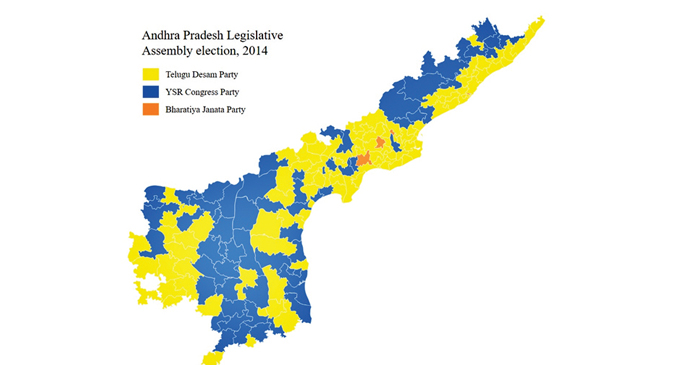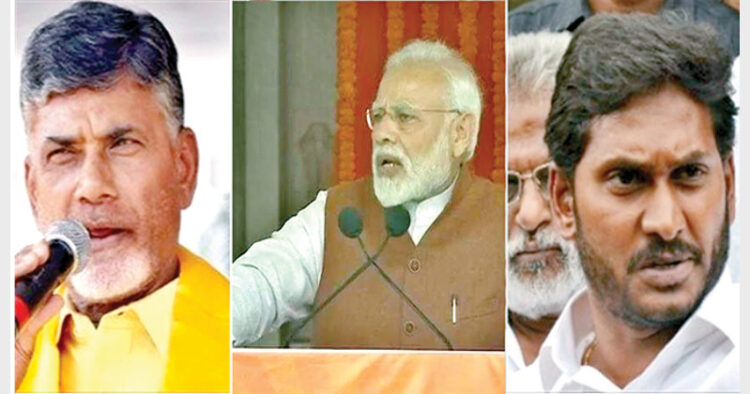People may be able to make their mind in the next few weeks. Unless they give their mandate in a clear cut manner, formation of a stable government is not possible
Venkata Seshasai Deevi
Ours is a federal setup and governance in our country goes according to the principles of a federation. Rights and responsibilities are divided between the Centre and the states. In the same way, both the Centre and the states collect revenue from people. Whatever the revenue collected by the states is retained by them and the Centre keeps a part of revenue collection with it and returns the remaining amount to the respective states.
Centre-State Relationships
According to the recommendations of the 14th Finance Commission which came into force from April 1, 2015, the share of states in Centre’s revenue collection was hiked to 42 per cent from 32 per cent existing at that time. With the 58 per cent share, the Centre has to discharge many duties and meet different types of expenditure in the course of its governance.

Some sections of media and intelligentsia in Andhra Pradesh raise a strange argument that the Centre is not at all doing any favour to our state as it is just giving back some amount of the revenue collected from our state. Further, they argue that the State need not give any explanation to the Centre regarding the utilisation of the funds granted by it. Some went a step further and asserted that the Centre has no right to collect revenue from the State. This is a very dangerous trend which is not at all suitable for a federal setup.
Major Players in Andhra Politics
United Andhra Pradesh had 42 Lok Sabha seats. After carving out Telangana in 2014 in what was unsavoury and hastily exercise by the UPA, Andhra is left with 25 Parliamentary seats. While the Telangana Rashtra Samiti (TRS) emerged as a significant political force, it was limited to Telangana where its foothold was strong. Under K Chandrasekhar Rao, the TRS became the most prominent political force in Telangana and it won the 2018 Assembly elections comfortably.On the other hand, the Telugu Desam Party (TDP), which was once had a pan-Andhra Pradesh presence, found not much support in Telangana as it had opposed bifurcation of the state. Despite taking over the reins of the new Andhra Pradesh, Chandrababu Naidu continuously lost popularity in the state due to a spate of allegations of corruption, nepotism and lack of governance. TDP which was part of the NDA in 2014, broke away from the alliance and joined the ‘Mahaghatbandhan’ citing the non-granting of the special status for the state as the reason. Since then, many cases of corruption, scandals, impropriety in centre funded projects like Polavaram, building the new capital Amaravati have emerged against Chandrababu Naidu and other TDP leaders. Give the rising unpopularity of TDP, most political observers and polls have suggested that TDP is making way for the YSRCP of Jagan Reddy. The TDP has 17 of its MP’s in the Parliament.Jaganmohan Reddy formed the YSR Congress Party after the demise of his father. Both the father and son were members of the Congress. Bifurcation of Andhra and Sonia Gandhi led UPA high-handedness were the reasons cited by Jagan Reddy to break away from the Congress and form his party in 2011. He claimed that his party would work for the Youth, Laborers and Farmers who had been neglected by the TDP and Congress alike. The popularity of Jagan and his party gradually rose and in the 2014 General elections, the party won from 8 parliamentary constituencies. In the Assembly elections the same year, YSRCP won from 67 constituencies, eating away from both the TDP and Congress. The Congress which was a significant force in Andhra was reduced to 22 from 134 seats it had won in 2009. The YSRCP had 9 MP’s in the Parliament.The INC which was a major political party in the state and the only competitor to TDP under NT Rama Rao was reduced to a minor player after the bifurcation of the state. The party lost its presence hugely in both the Telugu states. Most of its representatives have left the sinking ship and joined mostly TRS in Telangana or TDP and YSRCP in Andhra. Few have even joined the BJP which is now emerging as a major force in the State.The BJP which had won only two seats in the 1984 General Elections, one of them was from Andhra Pradesh. However, the party never really took a foothold despite the early gains in the Telugu state. In the 2014 Assembly elections, the BJP won from 4 seats. It is yet to make inroads into parliamentary constituencies in the state. Pollsters expect BJP to win at least 3 of the 25 constituencies in these general elections. Region-wise Strength of PartiesThe TDP with 103 seats in the Assembly and 17 in the Parliament has a strong presence in the coastal districts and the Deccan region bordering Karnataka. The present CM Chandrababu Naidu represents Kuppam which is in the Chittoor district.The other major party YSRCP has its presence mostly in central Andhra and areas bordering Telangana. The BJP has a good presence in Vishakapatnam and Rajahmundry districts. The Congress has no presence in the present Andhra Pradesh assembly. Its presence is limited to areas bordering Telangana.
It is the collective knowledge of people that various subjects in the governance are divided between the Centre and states. Centre has to take care of many aspects which require huge amounts. Maintenance of borders, maintenance of Army, procuring weapons for army, R & D in various fields like medicine, agriculture, defense, etc, maintenance of national highways, national educational institutions, space research and satellite launchings, allocation of funds to National Disaster Relief Fund (NDRF) and various welfare schemes taken up throughout the country, so on and so forth. The Centre has to manage all this expenditure with its share of 58 per cent funds. Hence, nobody can argue that the Centre has nothing to do with the revenue collected from the states.
Regional Parties and Leaders
Over-enthusiasm of local media in this issue caused much confusion in the minds of voters in the state. Most of the voters are not in a position to conclude as to who is right and who is wrong. Unlike
previous elections, this election is a bit tough for both contestants and voters. Some candidates are
mincing words when they are asked why people should vote for them. They are not able to mention a
few solid reasons to support their candidature.

In the same way, voters are also at crossroads. Most of them feel that the ruling party failed in many areas and cannot be voted back to power. At the same time, they have their own comprehensions about the competence of the opposition leader to rule the state which is facing many problems.
The entry of Pavan Kalyan as the third alternative is not convincing to most of the voters. The main reason for this situation is that the actor-turned-politician is constantly changing his stand. Instead of pointing out the failures of the ruling party, he is criticising the opposition leader in sharp words. Adding to this confusion, various media channels are conducting their own surveys and projecting different results. As such we can say there is some confusion existing in the state.
People may be able to make up their mind in the next few weeks. Unless they give their mandate in a clear cut manner, the formation of a stable government is not possible. If at all a situation of hung assembly arises, the state will be in big trouble.
(The writer is a educationist and writes on political and current affairs)














Comments